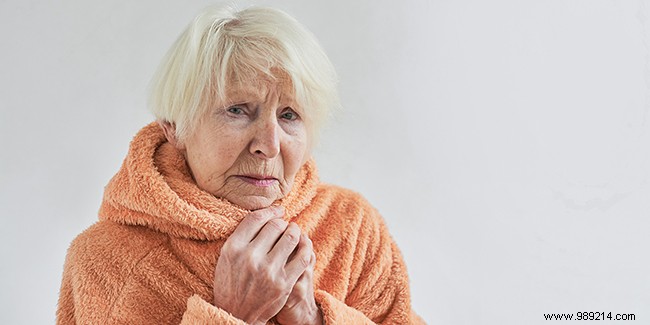
Hypothermia is not a disease but a condition that should be worrying. It results in an involuntary drop in body temperature. Hypothermia is confirmed when the internal body temperature is below 35°C. The health consequences can be serious, especially in the elderly who are more at risk than the rest of the population. What causes hypothermia? How to identify the symptoms of a drop in body temperature? How to act? Answers.
We often hear that the body temperature should be 37°C. This is not correct! It should be between 36.5°C and 37.5°C. Body temperature can vary over the course of a day and even over a lifetime. These changes are due to:
You should know that the elderly are people at risk. Their body has more difficulty maintaining a so-called normal body temperature.
When the body temperature of a person, including an elderly person, drops below 35°C, it is called hypothermia. This state is accompanied by many symptoms that we will develop later. In general, hypothermia weakens and represents a real danger to health. Seniors are particularly concerned by the risk of hypothermia. Why ? Because the body is more tired, it no longer functions optimally. People who suffer from a chronic pathology are also more vulnerable.
Hypothermia is caused by a drop in body temperature. Hyperthermia, on the other hand, is characterized by an increase in body temperature. We speak of hyperthermia when the temperature is above 38°C. The causes of hyperthermia are as follows:
Symptoms of hyperthermia are drier skin, bad mood, heart rhythm disturbances, confusion, stress, feeling unwell.
Hypothermia is a dangerous condition for health. It is proven if the body temperature is below 35°C. If it is between 32°C and 35°C, the hypothermia is moderate. It is severe if the temperature drops below 32°C. Unfortunately, older people do not have the ability to fully control their body temperature. The risk of hypothermia in seniors is therefore more frequent. Why ? As the body ages, blood circulation slows down. The body has difficulty retaining heat.
A person who has already had hypothermia is more likely to repeat episodes of the same type. Other risk factors exist such as seniors who have had a CVA (cerebrovascular accident), those who suffer from hypothyroidism and heart problems.
Hypothermia in the elderly must be identified and treated very quickly. Here are the warning signs.
It is essential to know the symptoms of hypothermia. Indeed, if it is too important, the elderly person is in danger. Vital functions are undermined, especially the cardiovascular system. We must act quickly.
It is essential to prevent hypothermia in the elderly. To do this, you must know how to identify the symptoms associated with this condition. In addition, risks must be identified and reduced. Here are some preventive measures to take to avoid hypothermia in seniors.
Having a healthy lifestyle is essential for good health. We know it. What we know less is that this healthy lifestyle can also slow down aging. What to do ?
It is important to consult your doctor as soon as you notice that you have symptoms of hypothermia. Most often, it is possible to find solutions so that hypothermia does not endanger your life.